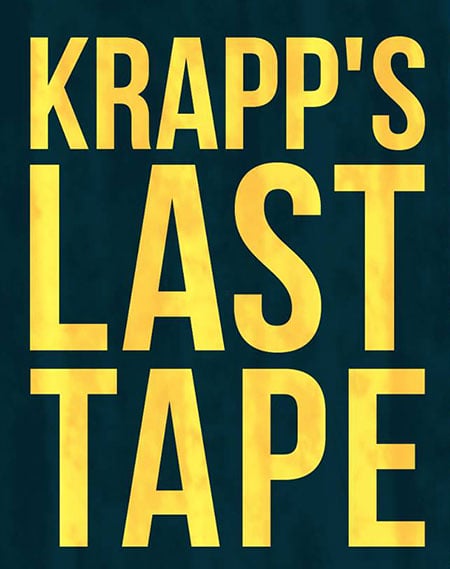
Courtesy photo
If one room in Fayetteville could contain all the angst of Samuel Beckett, the Block St Theatre Co. believes they’ve found it.
The theater company without a dedicated theater space will offer the one-man Beckett play “Krapp’s Last Tape” at The Nines for a seven-show run that begins tonight (Nov. 3) and continues through next weekend.

What: Block St Theatre Co.’s “Krapp’s Last Tape”
When: 7:30 p.m. Nov. 3-5 and Nov. 9-12
Where: The Nines, Fayetteville
Cost: $12 in advance or $15 at the door
Tickets: Visit blocksttheatreco.org
The show, written by Beckett in 1958, is set in a basement. The Quonset hut setting just off the Razorback Greenway trail system provided a perfect venue, says Todd Taylor, the company’s executive director.
“He [Krapp] has sequestered himself in his basement. The space really gives us so much of that effect,” he says.
And the show requires just one other thing – an actor to match the challenging script.
“You have to have the perfect actor at the right age,” Taylor says.
“It requires a real talent,” says the show’s director, Jason Shipman, who like Taylor studied drama at the University of Arkansas.
They’ve found their perfect Krapp in Bill Rogers, who has appeared in many works produced in this region, including several at TheatreSquared.
Shipman fell in love with the play more than a decade ago when it was produced at a theater where he worked as an apprentice. Later, in grad school, he mentioned the play to Rogers. Rogers bought the script and started reading. They often talked about the right time to stage it.
“We had a dialogue about this play for a few years,” Shipman said.
But it took the stars to align just right to make it work. Block St. Theatre Co. produces shows somewhat sporadically. It formed out of a group of college friends, and has produced a pair of Taylor’s original works. The founding members all work professionally in theater, and they travel to gigs around the country, “so we catch as catch can,” Taylor says. “When it lines up, we do a production.”
As Shipman was coming off a summertime gig, Rogers was ready to perform the part. They conducted several of the rehearsals using only their cell phones. And they spent the first few rehearsals, which started in earnest in September, learning the technical aspects of the show.
In “Krapp’s Last Tape,” a 69-year-old man listens to tapes recorded by his younger self. A working reel-to-reel machine plays a recording of the 39-year-old Krapp, which was voiced by Rogers and recorded in advance. Shipman describes the dialogue as a near 50-50 split between the younger Krapp of the recording and the three decades older one in front of the audience. Rogers becomes his own scene partner.
It creates a situation where “one performer lives through a couple generations of his life,” Shipman says.
The younger man is more confident, clear and self-important. The elder Krapp is grittier and perhaps a bit softer. The voices are distinct, but also clearly come from the same person. It can be a heavy play, but there are also moments of levity. Shipman says humor develops from watching Krapp become uncomfortable at the fool he was many years before.
“There’s a real universality to looking back at a younger self,” Shipman says.
Through the process, we see Krapp’s failures and regrets and loneliness.
“When an actor can really tap into that, it’s captivating. And Bill just has that in spades,” Shipman says.
Taylor says that despite the theoretical ease of staging the show – considering it’s a one-man production with minimal set requirements – the production took a lot of effort. It was difficult to locate a working tape machine, for one thing. And the playwright always has surprises.
“Beckett is tough to wrangle with,” he says.
But that also presents an opportunity for the 24 people who will have the opportunity to see the show each night.
“It’s a rare chance to see a true classic by Samuel Beckett, with an actor who is a real local treasure,” Taylor says. “He grapples with an iconic role.”
And following the local production, Block St. Theatre Co. will grapple with their first out-of-town show. Theater Wit in Chicago will host a six-week run of the company’s production of the Taylor original “Flamingo & Decatur,” which is loosely based on Taylor’s time as a full-time poker player in Las Vegas.
This distant production bodes well for the company, Taylor says.
“It’ll really launch us into a much more ambitious scale,” Taylor says.
Perhaps as ambitious as one man taking on his former self.

